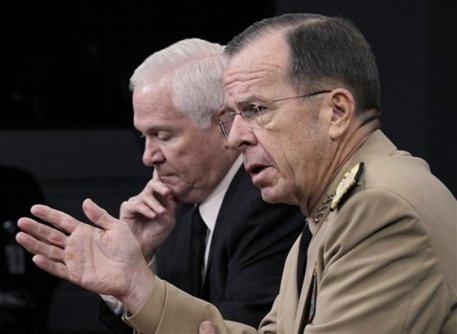
Consider this weekend's op-ed in the Wall Street Journal by Bill Kristol, Ed Feulner and Arthur Brooks the latest entry in the continuing uncertainty among Washington insiders as to the foreign policy beliefs of the Tea Party movement. The trio write in defense of Defense spending, not just against the cuts currently planned under Secretary Gates, but against the perception on the part of deficit hawk Tea Party voters that the military is one big drag on the United States' debt picture:
Defense spending has increased at a much lower rate than domestic spending in recent years and is not the cause of soaring deficits. Even as the United States has fought two wars, the core defense budget has increased by approximately $220 billion since 2001, about a tenth as much as the government devotes each year to "mandatory" spending: Social Security, Medicare, Medicaid, lesser entitlements such as food stamps and cash assistance, and interest payments on the debt. These expenditures continue automatically, year after year, without congressional debate.We should be vigilant against waste in every corner of the budget. But anyone seeking to restore our fiscal health should look at entitlements first, not across-the-board cuts aimed at our men and women in uniform.
In my view, Secretary Gates isn't seeking cuts aimed at men and women in uniform, but at technology which serves no purpose within a broken procurement process that is out of touch with the demands of the real world. But assume I am wrong, and that the Kristol et al. argument is an accurate critique: if that's the case, this has to be considered a case of right message, wrong messengers. While Brooks has no quarrel with the Tea Partiers, Feulner's organization endorsed TARP, and Kristol is perhaps the poster child of the kind of insider-ism which Tea Partiers are soundly rejecting.
A longtime critic of any cuts in Defense spending, Kristol's brand of "national greatness conservatism" (he and David Brooks unveiled the phrase in a 1997 piece in the WSJ) arguably ruled in the White House and in Republican circles for much of the past decade. Today, these "big government" views are anathema to the Tea Party, and Kristol's declarations of support and membership always appear to be paired with a trite tsk-tsk-ing at the people who make up this populist movement, with critiques often leveled at Tea Party darlings such as Rand Paul and Christine O'Donnell. Does it really make sense to trot out Kristol - a man whose opinion is politely disregarded at best by this populist upheaval on the right - on behalf of these views?
Of course, I doubt Kristol and others have anything to worry about. The best source for data on leaders within the Tea Party movement is the research provided by the Sam Adams Alliance, a Chicago-based group which found that Defense issues rate very high in importance among Tea Partiers. While Budget/Economy/Jobs categories are obviously the highest, Defense is high as well - and it's doubtful that indication of concern could in any way be interpreted as a call for cutbacks. But for those who are concerned that this populist movement will turn against the Defense budget after this election, I'd suggest they get to work on finding a better spokesperson than Bill Kristol to take this message to the Tea Parties.
(AP Photo)











